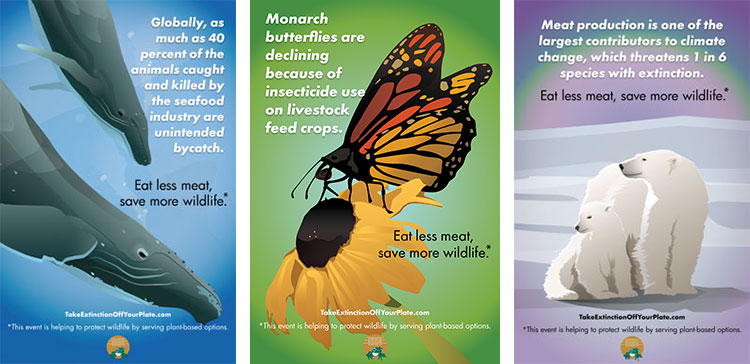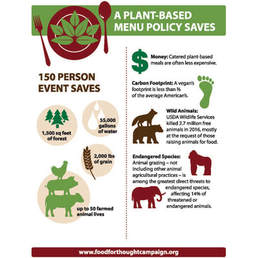Food for Thought How to: "Why Vegan?" Resource
At Food for Thought, we’re here to help. We’re here to help all species, our planet, and each other. Our campaign encourages animal, environmental, and wildlife nonprofit organizations to adopt animal- and earth-friendly menu policies. By doing so, these organizations’ actions and ethics better align, and their impacts are further amplified. …
At Food for Thought, we’re here to help. We’re here to help all species, our planet, and each other. Our campaign encourages animal, environmental, and wildlife nonprofit organizations to adopt animal- and earth-friendly menu policies. By doing so, these organizations’ actions and ethics better align, and their impacts are further amplified.
Food for Thought wants to bridge common gaps in thinking. In order to make the transition to veg-only events as simple as possible, we have a variety of resources to offer. From sample letters to grant opportunities to testimonials and beyond, Food for Thought wants to make it easier for your board to approve a formal policy. One of our most popular resources is our Why Vegan? series. We offer Why Vegan for Farmed Animals, Why Vegan for the Planet, and Why Vegan for Wildlife, all of which dive deeper into the reasons why respective groups will benefit from going plant-based.
In Why Vegan for Farmed Animals, we focus on how all nonhuman animals deserve the same amount of respect and compassion—whether they be a kitten or a piglet. Just like the animals we share our homes with, farmed animals are sentient beings who have the innate desire to live. After all, it doesn’t make any sense to host an event to raise money to save animals’ lives while serving other species for the meal.
Why Vegan for the Planet emphasizes the realities of animal agriculture and its effects on the health of our earth. The two are directly linked due to the fact that the production of meat is one of the leading causes of greenhouse gas emissions, as well as a top contributor for loss of biodiversity, species extinction, and pollution. One of the best ways to become true leaders in the sustainability movement is to forgo all animal products.
Why Vegan for Wildlife discusses the need to help all nonhuman animals, especially since more than 98% of animals that die at the hands of humans are actually farmed animals; therefore, wildlife nonprofits should consider extending their impact to include helping these species. Animal agriculture is also one of the leading threats to wildlife habitat loss, as well as waterway contamination, ecosystems disruptions, and deforestation. In order to further their own conservation efforts, wildlife groups would benefit from no longer supporting the very businesses that are hurting the lands and species they are trying to save.
At Food for Thought, our aim is to help all of these groups realize we have a responsibility to every living creature and to the health of our planet. Whichever cause is closest to your heart, please consider sharing the appropriate Why Vegan? resource with those stakeholders. One change can make a world of difference in all three areas.
Expand your compassion to your org’s own plate by adopting a plant-based menu policy. Let Food for Thought help you get started today! Contact us to get your organization on track to having its values and actions match up.
Center for Biological Diversity and Animal Place Partner to Offer Food for Thought on Animal Agriculture
GRASS VALLEY, and SAN FRANCISCO, CA – Animal Place and the Center for Biological Diversity today announced they are teaming up to call on environmental organizations and conferences to adopt earth- and animal-friendly menu policies. …
Gary Smith | Evolutus PR | 818-783-0569 | gary@evolotuspr.com
Patti Nyman | Animal Place | 530-477-1757 ext 3 | patti@animalplace.org
Jessica Herrera | Center for Biological Diversity | 520-260-1725 | jherrera@biologicaldiversity.org
GRASS VALLEY, and SAN FRANCISCO, CA – Animal Place and the Center for Biological Diversity today announced they are teaming up to call on environmental organizations and conferences to adopt earth- and animal-friendly menu policies.
Among other projects, the two groups are co-developing materials, securing speaking opportunities, and challenging the movement to adopt plant-based policies with Animal Place’s “Food for Thought” campaign.
“The environmental community can no longer ignore the disastrous effects of animal agriculture on the planet,” said Stephanie Feldstein, population and sustainability director of the Center for Biological Diversity. “If we want to protect the environment, we need to switch to a diet that’s better for the climate, wildlife, and our own health by reducing our meat consumption.”
Animal agriculture is a primary cause of climate change, habitat destruction, biodiversity loss, water use, pesticide use, and pollution. It is responsible for 14.5 percent of global greenhouse gas emissions. And Americans eat an average of three times as much meat per capita as the rest of the world.
“By joining forces with Center for Biological Diversity, we have an important ally in the environmental movement as we promote the necessity of veganism for sustainability, preserving habitats, and protecting all animal species,” said Patti Nyman, Campaigns Manager at Animal Place.
The Center’s Take Extinction Off Your Plate campaign is the first program of its kind making the connection between animal agriculture and threats to wildlife. It encourages people to reduce meat consumption as a critical means of reducing their environmental footprint. In accordance with its mission, the Center’s board-approved menu policy specifies that organizational events serve only plant-based foods.
Animal Place maintains a “report card” of organizations that have board-approved earth- and animal-friendly menu policies—and those that do not. Its Food for Thought campaign works with and awards grants to animal and environmental protection groups to encourage animal-friendly vegan menus at their sponsored events, and is endorsed by national organizations and federations, veterinarians, celebrities, and other public figures.
About the Center for Biological Diversity
The Center for Biological Diversity is a national, nonprofit conservation organization with more than 1.6 million members and online activists dedicated to the protection of endangered species and wild places. For more information visit biologicaldiversity.org.
About Animal Place
Animal Place, founded in 1989, is one of the oldest and largest animal sanctuaries in the nation, operating a 600-acre sanctuary in Grass Valley, California and an all-vegan market in Berkeley, California. Animal Place’s California animal shelters fill a much-needed niche of farmed animal rescue, sanctuary, education, and adoption. Animals arrive from small and large farms, slaughterhouses, research facilities, and neglect or cruelty cases. Nestled between Sacramento and Lake Tahoe, its Grass Valley location offers tours, cooking classes, and workshops at the sanctuary as well as volunteer and internship opportunities. In 2010, Animal Place began rescuing animals directly from California egg farms, and since then has saved more than 26,000 hens. Animal Place—named best farm sanctuary in the country by Best in Shelter—is a nonprofit 501c3 organization funded by private donors. For more information, visit animalplace.org.








